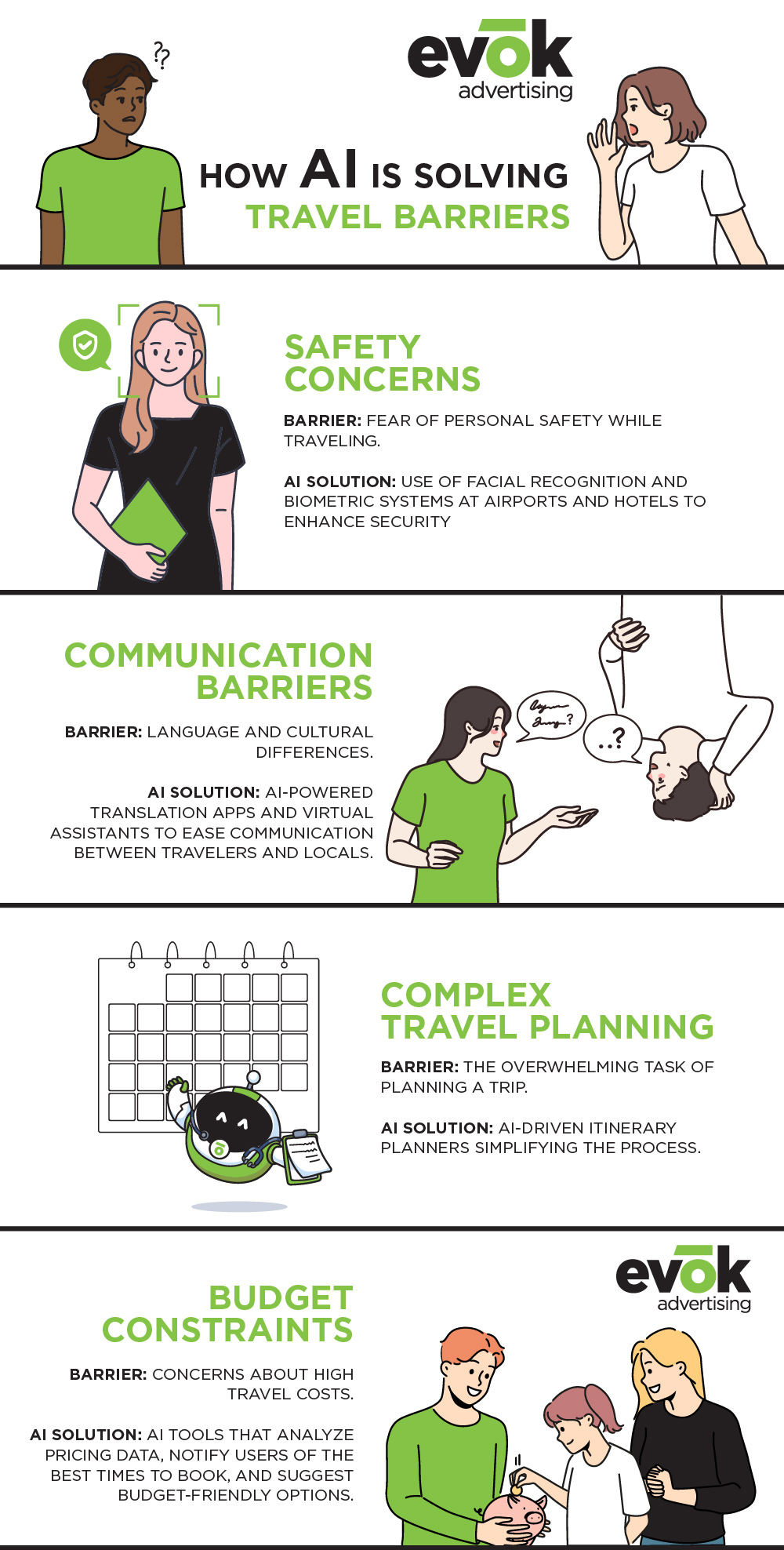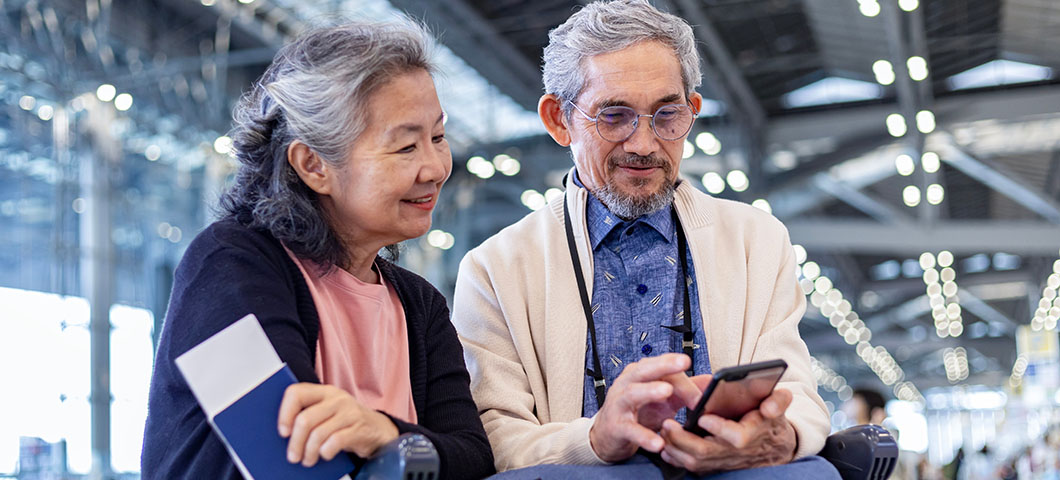
How Artificial Intelligence Is Changing the Travel Industry: Balancing AI Innovation with Human Touch
From predicting the perfect moment to book your flight to robots delivering room service, artificial intelligence is rapidly transforming every aspect of how we explore the world. This isn’t science fiction—it’s the dawn of AI-powered travel. But as algorithms optimize our journeys, a crucial question emerges: in an industry built on human connections, how do we balance the efficiency of AI with the irreplaceable warmth of a genuine smile? Join us as we navigate the exciting, sometimes turbulent, skies of travel’s AI revolution, where cutting-edge technology and timeless hospitality are learning to coexist.
Integrating AI presents an opportunity for travel companies to improve business performance. According to McKinsey Digital estimates, companies that holistically address digital and analytics opportunities throughout their organizations can see a 15—to 25 percent improvement in earnings. This growth potential, however, must be balanced with preserving the human touch to keep travelers returning.
As AI helps solve common traveler concerns—such as safety, communication barriers, and the complexity of planning—marketers face a unique challenge: blending technological innovation with authenticity. This blog will explore how AI can enhance customer experiences and business outcomes while ensuring human interaction remains a core element of travel.

Why People Hesitate to Travel and How AI Can Address These Barriers
Certain barriers stand in the way of many potential travelers fully embracing travel. Concerns about safety, communication challenges, the complexity of planning and budget constraints often deter people from exploring new destinations. Fortunately, AI offers innovative solutions to help travel brands address these hesitations and attract more visitors.
Safety Concerns
Many people avoid travel due to fears about personal safety. AI technologies are playing a crucial role in alleviating these worries. Facial recognition and biometric systems are already being implemented in airports and hotels to enhance security and streamline processes such as check-ins and boarding. These AI-driven measures create a more secure travel environment, which can help alleviate safety concerns and encourage more people to travel.
Communication Barriers
Language and cultural differences can discourage travelers who worry about navigating foreign destinations. AI-powered translation apps and virtual assistants can break down these barriers by providing real-time translation and support. Travel brands leveraging AI to improve communication between travelers and locals attract a wider audience, especially those hesitant due to language limitations.
Complex Travel Planning
Many travelers find the time and effort required to plan a trip overwhelming, especially when faced with endless options for accommodations, activities, and transportation. AI-driven tools, such as personalized travel itinerary generators, simplify this process by curating recommendations based on individual preferences, previous behavior, and real-time data. For destinations, offering AI-powered planning solutions enhances the traveler experience and helps promote local attractions, events, and services. Using AI to guide travelers toward personalized options, destinations can boost visitor engagement and encourage longer stays.
Budget Concerns
AI can be a powerful tool for helping budget-conscious travelers find the best deals and make more cost-effective decisions. AI-powered platforms, like flight and hotel booking apps, use machine learning algorithms to analyze vast amounts of pricing data and predict the best times to book for maximum savings. For example, AI tools can notify users when flight prices are expected to drop or suggest more affordable travel dates and destinations based on their preferences and spending limits. Dynamic pricing algorithms enable AI to help travelers personalize their search, matching them with travel options within their budget. AI can also assist in finding hidden discounts or bundling packages (flights, accommodations, and activities) to offer travelers better value for money.
AI Technologies Shaping the Travel Industry Today

As AI continues to advance, it is revolutionizing the way travel companies operate and deliver services, making the future of travel more efficient, personalized, and customer-centric. Key technologies like predictive analytics, dynamic pricing, and AI-powered tools in hospitality are setting the stage for this transformation.
Predictive Analytics and Dynamic Pricing
AI is reshaping pricing strategies through predictive analytics, allowing travel companies to make real-time adjustments based on demand, market conditions, and consumer behavior. Forbes explains AI can forecast trends and suggest optimal pricing strategies, ensuring businesses stay competitive while maximizing revenue. For travelers, this translates to more personalized offers and better deals. Machine learning further empowers these capabilities by providing hyper-personalized experiences in alignment with a traveler’s specific preferences and past behavior, enhancing customer satisfaction and loyalty.
AI-Powered Tools in Hospitality
AI also transforms the hospitality sector by deploying AI-driven chatbots, robots, and automation technologies. These tools improve operational efficiency and streamline guest services, from chatbots handling basic customer inquiries in real-time to robots managing concierge services or delivering room service. Automating repetitive tasks allows human staff to focus on delivering more personalized interactions where they are most needed.
These innovations enhance the guest experience and drive operational improvements for hotels, restaurants, and travel providers. By offering quicker responses, seamless services, and convenience, AI-powered tools can increase customer satisfaction, repeat business, and positive reviews, further boosting a destination’s reputation and success.
The Balance Between AI and Human Touch

While artificial intelligence is transforming the travel industry, the importance of human interaction cannot be overstated. Despite AI’s convenience and efficiency, many travelers still value personal, human connections, especially regarding customer support and planning. According to a national survey commissioned by justfly.com, as highlighted in Hotel Management Network, nearly 90% of travelers believe human interaction is essential, particularly when they need assistance or face complex issues during their trips. Only 35% of respondents consider human interaction necessary for travel bookings, and 29% prefer live customer service agents for itinerary planning.
This data underscores the need for a hybrid approach combining AI’s capabilities with the human touch. AI tools, such as chatbots and automated services, are highly effective at handling routine inquiries, providing real-time responses, and managing repetitive tasks. However, human agents remain irreplaceable regarding more nuanced, emotional, or complex interactions. Travelers appreciate personalized attention, especially in moments of uncertainty, where empathy and understanding play a vital role in delivering exceptional customer service.
By integrating AI with human expertise, travel brands can offer the best of both worlds. AI enhances efficiency, streamlines operations, and offers real-time support, while human agents provide the warmth, empathy, and problem-solving skills that build trust and loyalty. This balance allows travel companies to improve the traveler experience and operational efficiency, ultimately fostering more robust customer relationships and encouraging repeat business. As AI evolves, successful brands will harness its potential without losing sight of the human element at the heart of travel.
Practical AI Implementation Strategies for Travel Marketers

Adopting AI isn’t just about using cutting-edge technology—it’s about strategically integrating it into marketing efforts to drive results. Here are a few ways travel brands can leverage AI to optimize their marketing strategies and improve customer experiences with the support of an experienced partner like evok:
Personalization at Scale
AI enables travel brands to deliver hyper-personalized marketing content to individual customers at scale. By analyzing customer data, such as past behaviors and preferences, AI tools can create tailored offers, recommend destinations, and curate experiences for each traveler. As a leading destination marketing agency, we specialize in crafting personalized campaigns incorporating AI-driven insights, ensuring your brand message connects with the right audience at the right time.
AI-Driven Customer Insights
Brands can harness AI to gain deeper insights into customer behavior. We use AI-powered analytics tools to help identify patterns in travel preferences, booking behaviors, and engagement across digital touchpoints. These insights allow for more informed decision-making in marketing campaigns, helping to refine targeting, messaging, and timing for maximum impact.
Automating Routine Marketing Tasks
AI-powered automation tools can handle repetitive marketing tasks such as customer service responses, social media management, and campaign reporting. Automating these tasks increases efficiency and enhances customer service without sacrificing quality. We help our clients implement AI-driven automation tools, allowing your team to focus on high-value activities to boost engagement and conversions.
Measuring AI’s ROI
To ensure AI investments are effective, brands must regularly evaluate AI-powered initiatives’ return on investment (ROI). Tracking metrics like customer acquisition cost (CAC), customer lifetime value (CLV), and engagement rates can provide a clear picture of AI’s impact on marketing performance. We support brands in measuring AI’s effectiveness and continuously refining campaigns to maximize their ROI.
Embracing AI for a Smarter Travel Experience

As AI continues to reshape the travel industry, the challenge for travel marketers is finding the perfect balance between leveraging advanced technology and preserving the human touch that makes travel experiences truly memorable. From addressing safety concerns to simplifying complex travel planning, AI offers unparalleled opportunities to improve customer satisfaction and business performance. However, success lies in integrating these technologies thoughtfully, ensuring personal, human interactions enhance the benefits of AI.
At evok, we understand navigating the evolving landscape of AI-driven marketing requires expertise and creativity. Our team of travel & tourism marketing experts is here to help you harness the power of AI while ensuring your brand’s message remains authentic and engaging. Whether it’s through personalized campaigns, AI-powered insights, or strategic automation, we partner with you to create marketing solutions that drive real results.
Ready to elevate your Travel & Tourism Marketing? Book time with our team to discuss how an effective balance between AI & Human Touch can benefit your destination. As your destination marketing agency, we’ll help you leverage AI technology while maintaining the authentic experiences that make your destination unique. Connect with our destination marketing experts today to begin your journey toward smarter, more effective destination promotion.